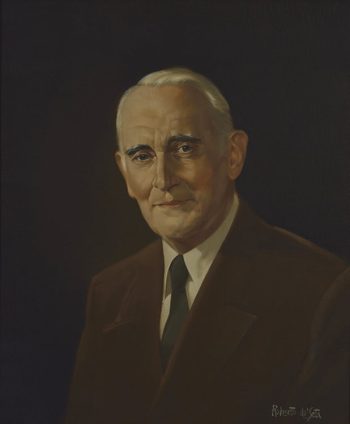Dr. Francis W. Schofield
- Canadian Agricultural Hall of Fame
- Inductees
- Dr. Francis W. Schofield

- Inducted: 1975
- Residing Province: Manitoba
- Gallery Location: 106
Dr. Francis W. Schofield
- (1889
- -
- 1970)
While serving on the staff of the Ontario Veterinary College (1921-1955,) initially as director of Veterinary Hygiene and Research, and subsequently as professor and head of the Department of Pathology, Dr. Frank Schofield established an enviable reputation as a teacher. Students attending his lectures were greatly stimulated by them.
However, it was in the field of research that he made his greatest contribution. His investigations led to the discovery of dicumarol (in mouldy sweet clover) as the cause of hemorrhagic disease of cattle, and this discovery formed the basis for modern anticoagulant therapy in humans, and for the commercial production of such pest control products as rat poison.
With respect to joint ill in foals, Schofield’s work dealing with causative bacteria set the stage for antibiotic treatment, which became available years later.
The astuteness of his predictions regarding disease processes, based on investigations conducted during a period when funds for such purposes were quite limited, were not fully appreciated until verified by the application of modern research techniques.
Previous to joining the OVC staff, he served as a Presbyterian teacher missionary in Korea, during which time he developed respect bordering on affection for the native people. Consequently, upon his retirement in 1955, he returned to Korea to teach veterinary science and Christian beliefs.
Because of his many contributions to veterinary science, he gained international recognition and received many honours, including an Honourary Degree in Veterinary Medicine from Ludwig Maximilian University of Munich, Germany in 1950; and an Honourary LLD from the University of Toronto in 1962.
Au Collège vétérinaire de l’Ontario de 1921-1955, Dr. Frank Schofield a travaillé d’abord comme directeur de l’Hygiène vétérinaire et de la recherche, puis comme professeur et chef du Département de pathologie, où il établi une réputation enviable en tant que professeur. Les étudiants qui fréquentaient ses cours y ont été fortement stimulés.
Cependant, ce fut dans le domaine de la recherche qu’il a fait sa plus grande contribution. Ses investigations ont abouti à la découverte de dicumarol (qu’on retrouve dans le mélilot ou trèfle d’odeur moisi) comme la cause de la maladie hémorragique du bétail, et cette découverte a servi de base pour la thérapie moderne d’anticoagulants chez l’homme, et pour la production commerciale de produits antiparasitaires tels que le poison à rat.
En ce qui concerne la maladie articulaire chez les poulains, le travail de Schofield sur la bactérie causale a ouvert la voie à un traitement antibiotique, qui est devenu disponible des années plus tard.
La sagacité de ses prédictions concernant le développement des maladies, basées sur les recherches menées au cours d’une période où les fonds à ces fins étaient assez limités, n’ont été pleinement appréciées qu’après avoir été vérifiées par des techniques de recherche modernes.
Avant de se joindre au personnel de l’Ontario Veteranary College il a travaillé en tant qu’enseignant missionnaire presbytérien en Corée, période où il a développé un respect affectueux pour ce peuple. Après sa retraite en 1955, il est retourné en Corée pour enseigner les sciences vétérinaires et la religion chrétienne.
En raison de ses nombreuses contributions à la science vétérinaire, il a acquis une reconnaissance internationale et a reçu de nombreux honneurs, dont un grade honorifique en médecine vétérinaire de l’Université Ludwig Maximilian de Munich, en Allemagne en 1950; et un doctorat en droit honorifique de l’Université de Toronto en 1962.
- Canadian Veterinary Medical Association


